Jun 16, 2025 – Visit to Japan
Hello. Today, Sunim visited Japan to meet with key political figures to discuss peace on the Korean Peninsula, as well as ways to improve Korea–Japan and North Korea–Japan relations.
Sunim departed from Jungto Center at 4:30 AM and arrived at Incheon Airport at 5:30 AM. He left Incheon Airport at 7:15 AM and arrived at Tokyo’s Haneda Airport at 10:30 AM.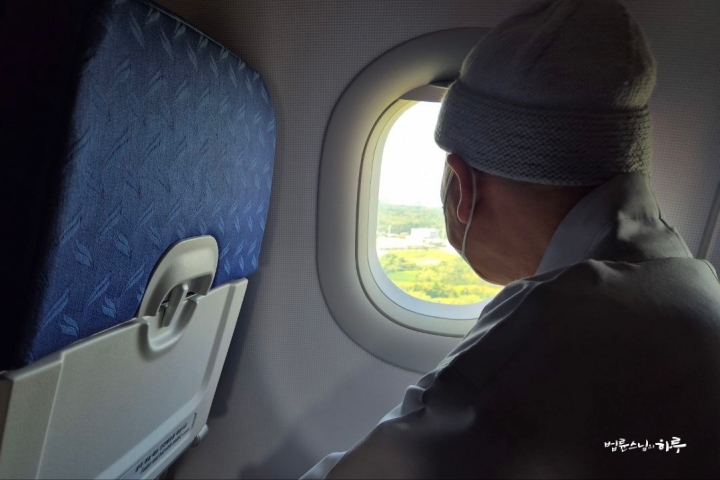
Arriving at the meeting place on time, Sunim met with Mr. Takeo Kawamura, Chairman of the Japan-Korea Friendship Association (former Chief Cabinet Secretary), and Mr. Sanjo Hosaka, Vice Chairman of the Japan-Korea Friendship Association.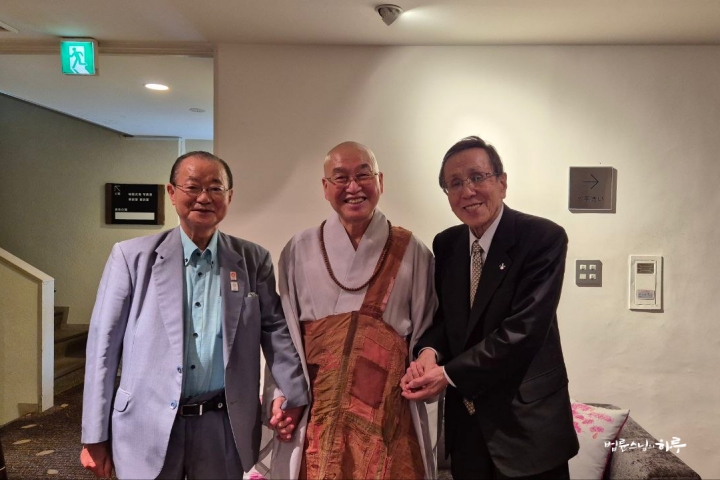
They had an in-depth conversation about how to improve Korea-Japan and North Korea-Japan relations for peace in Northeast Asia. Sunim discussed ways to reduce the risk of war on the Korean Peninsula by strengthening cooperation among East Asian countries. The senior Japanese leaders expressed strong agreement with Sunim’s ideas and promised to share his views with key decision makers in Japan.
Interpretation was provided by Ms. Lee Hwa-young, who serves as the Tokyo Group Facilitator for Jungto Society’s overseas branches. Ms. Lee Ju-eun, Team Leader of Overseas Branch Activities, and Mr. Kim Hyung-seok, Tokyo Group Facilitator, also accompanied the group, providing driving and protocol support. Sunim expressed his gratitude to the Jungto Society members who volunteered their services.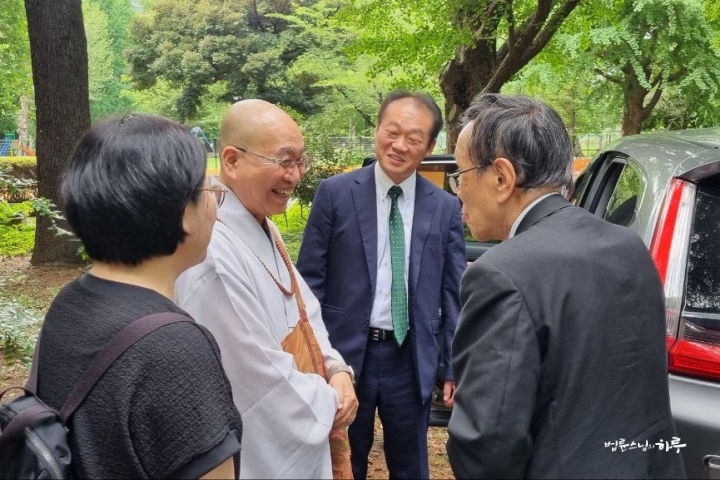
After the meeting, on the way to the airport, Sunim visited a temple called Sosenji.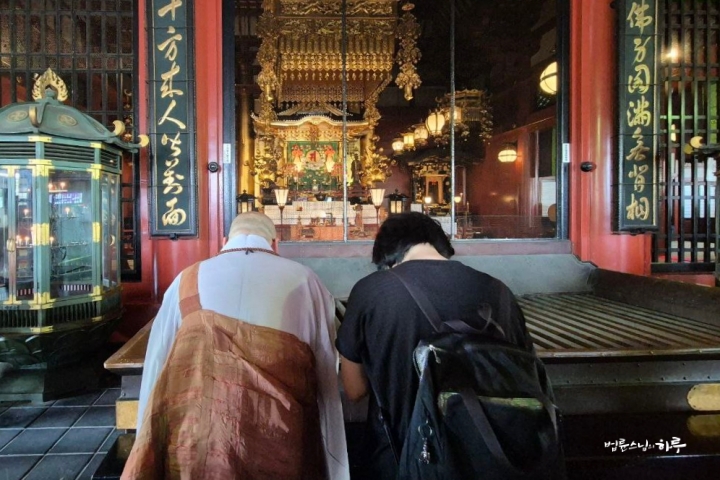
At Narita International Airport, Sunim boarded his 9:15 PM flight to Bangkok in Thailand.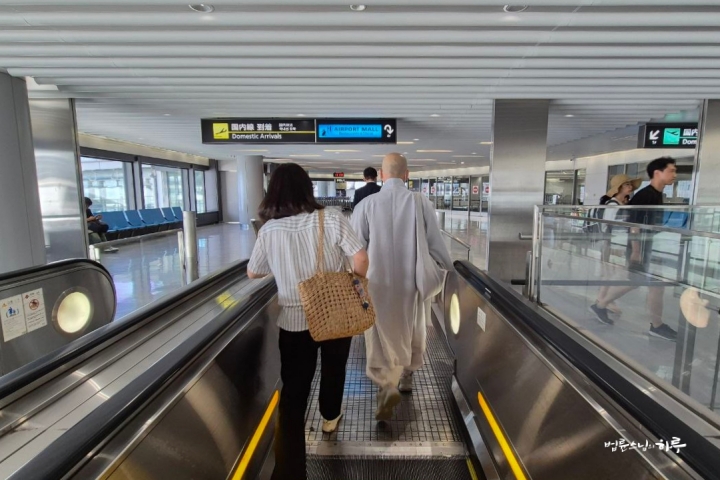
Starting tomorrow, Sunim will visit Bhutan for a week. He arrived at Bangkok’s Don Mueang International Airport at 2:40 AM local time. Ms. Hwang So-yeon from the Bangkok Group had been waiting for Sunim at the airport with her husband since 1:00 AM. They then transferred to Suvarnabhumi Airport, where they had rice noodle soup and completed check-in procedures for the flight to Bhutan’s Paro Airport at 4:30 AM. Tomorrow, Sunim is scheduled to fly from Bangkok to Paro Airport at 7:30 AM, followed by a full-day drive to Trongsa.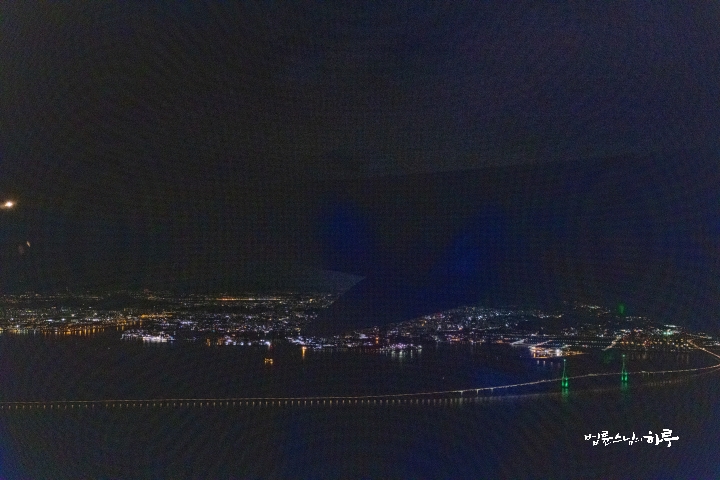
Since there was no Dharma talk today, I’ll close by sharing the Dharma Q&A session from Happy Citizens Activity Festival held in Daejeon the day before yesterday.
My Father Made an Extreme Choice Right After Our Last Phone Call. How Can I Let Go of This Guilt?
“This is a heartbreaking story. However, from my perspective, it seems you may be holding yourself to an unrealistically high standard in this situation. In other words, you seem to think of yourself as too great a being. Do you perhaps think you’re someone on the level of Buddha?”
“No, I don’t.”
“Do you think you’re on the level of Jesus?”
“No, I don’t.”
“Do you think you’re on the level of Pope Francis?”
“No.”
“You’re thinking that way right now. Without realizing it, you unconsciously regard yourself as an extremely virtuous and great being. But your mother and brother don’t see you as such a great being. They just see you as an ordinary citizen, one of countless people in the world. That’s why your evaluations of this incident differ.
In that situation – with your son having gotten into trouble, your parents fighting, your mother calling, and you ending up talking to your father – your response wasn’t particularly wrong. Any ordinary person could only have done about the same. That’s why your mother and brother tell you, ‘It’s not your fault.’ They think, ‘Even if I had taken the call instead, I could only have done what you did.’ But because of your love for and attachment to your father, you’re driving yourself hard thinking, ‘I should have done better.’
But to be able to take your father’s side and offer comfort in that situation, you would need to be at the level of Jesus or Buddha. That’s why I say it’s a slight delusion of grandeur. You’re not Jesus, not Buddha, and not Confucius, right? Then even if the same thing happened again, you could only respond the same way you did then. Now you think, ‘If I could go back, I would have comforted my father,’ but if a similar situation arose with your mother or brother, you’d likely only be able to respond in the same way again. Because you’re not such a great saint.
When your mother or brother look at you, they have the premise that ‘an ordinary person could only do that much,’ so they say, ‘It’s not your fault.’ But you’re caught up in the fact that your father was good to you, and you regret thinking, ‘If I had done a little better, my father wouldn’t have made that choice.’ So you’re setting yourself up as a great being and regretting not being able to be that being. This is why there’s a difference between how your mother and brother see ‘you’ and how you see yourself. But in reality, even if the same thing happened again, you couldn’t act much differently. It’s not easy to act like Buddha.
Buddha went to a house to receive alms, and the person hurled terrible curses at him. How would you respond? Could you smile gently? It’s actually not easy, right? But Buddha smiled gently and conversed with the person. When someone curses at you first thing in the morning, you’d naturally respond, ‘Why are you cursing?’ Then the other person might say, ‘Because you came begging for food in the morning!’ Then you might say, ‘When did I ask for food? I was just standing in front of the house, why are you cursing?’ and an argument would likely ensue. To smile gently and continue the conversation in that situation is really difficult. Because I’m not yet at Buddha’s level. But you think of yourself as if you’re someone at about Buddha’s level. You’re feeling regret and guilt thinking, ‘Buddha wouldn’t have done that.’
You are not Buddha. Of course you have shortcomings, but you need to first understand that this wasn’t your fault. If you were really at Buddha’s level, you could say, ‘I responded wrongly then.’ At that level, such a response would be inadequate. But at your current level, there was no other way in that situation.
Euthanasia is not permitted in our country. But in a situation like your father’s, where even narcotic painkillers couldn’t control the pain, even I would have chosen euthanasia. I once had a migraine that lasted for a month, and the pain was so severe that, to put it bluntly, I really wanted to cut off my head with a cleaver. The pain was like being stabbed with an awl continuously – it was truly hell. When pain is this severe, it’s unbearable for a person. Usually, when pain is too severe, the person is elderly, and treatment is difficult, most cases are managed with morphine. If you go to a hospice ward, there are many such patients. But euthanasia is not legally permitted in our country. So if someone chooses death themselves, it becomes suicide. If you get legal permission, it’s euthanasia, but without permission, it’s suicide. Even though it’s your own life, it becomes something that requires permission.
Your father decided that there was no possibility of recovery through hospital treatment, and that it would be better to die than to live in agony with extreme pain. So he had already prepared to die. But when you’ve already made such a decision in your heart, if someone criticizes you, those words feel even more hurtful. Your mother spoke without knowing your father’s resolve, but because your father had already made up his mind, he took it more painfully thinking, ‘How long do I have to live that she says such things?’ If your father had expressed his decision beforehand, both your mother’s and your attitude would have been different. Because your mother didn’t know, she said, ‘Why are you acting like this?’ and those words would have hurt your father even more. There’s no way to change this. It’s not a good thing, but you have to accept it as something unavoidable. You shouldn’t blame your mother, resent your father, or blame yourself for this. You should see that each person did what they could in their position. It would have been better if it hadn’t happened, but in the human world, there’s no other way to prevent such things.
When voting, some people vote because they really like a candidate, but sometimes you have to choose between two options even if you don’t really want either, right? Similarly, in life, there are moments when you must make choices that aren’t desirable but are unavoidable. Considering such cases, I think systems like euthanasia need to be allowed to some extent. In fact, people with money sometimes go to Switzerland for euthanasia. While what happened to your father is truly unfortunate, you don’t need to blame yourself and suffer for a long time over this.”
“Thank you. I understand well.”





